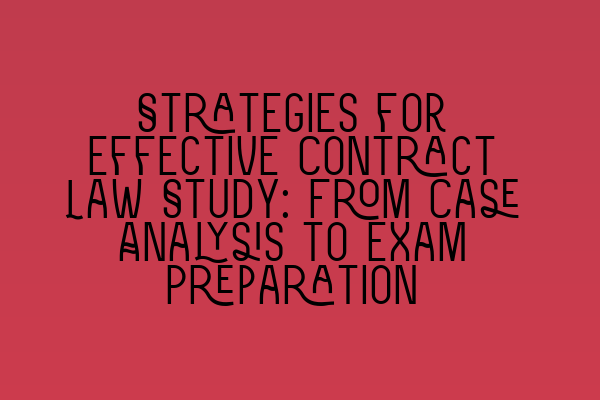Strategies for Effective Contract Law Study: From Case Analysis to Exam Preparation
Contract law is a fundamental area of legal practice, and studying it requires a structured approach that encompasses case analysis and exam preparation. Whether you are a law student or a professional seeking to enhance your contract law knowledge, employing effective strategies can greatly aid your understanding and help you succeed in exams. In this article, we will explore various strategies that can be utilized to study contract law effectively.
1. Understand the Basics
Before diving into complex case studies and legal concepts, it is crucial to have a thorough understanding of the basics of contract law. Start by familiarizing yourself with the key principles, elements, and types of contracts. This foundation will provide you with a solid framework upon which you can build your knowledge.
To gain a deeper understanding of the basics, it is beneficial to engage with real-life case studies. These case studies provide insights into legal practice and decision-making processes. You can find some valuable examples in the article on Unveiling Real-Life Case Studies: Insights into Legal Practice and Decision-Making.
2. Analyze Case Law
Case law forms the backbone of contract law, and analyzing key cases is essential to grasp the nuances of contractual principles. Take the time to carefully read and understand landmark contract law cases. Pay attention to the facts of each case, the legal issues involved, and the court’s reasoning behind its decision.
When analyzing cases, make notes on the key legal principles established, the reasoning, and any policy considerations discussed. It is also helpful to compare and contrast different cases to gain a broader perspective on how contract law principles evolve and are applied to varying factual scenarios.
If you would like to explore more case studies and insights into legal practice, check out the article on Unveiling Real-Life Case Studies: Insights into Legal Practice and Decision-Making.
3. Take Effective Notes
When studying contract law, taking effective notes is crucial. Organize your notes in a way that enables easy reference and review. Consider using headings, subheadings, and bullet points to structure your notes based on different topics and legal principles.
Additionally, highlight key cases, legal principles, and any relevant statutory provisions. By doing so, you can quickly identify and review important information when preparing for exams or when applying contract law principles to real-life scenarios.
4. Engage in Practice Questions
Understanding contract law principles is one thing, but being able to apply them effectively is quite another. Engaging in practice questions is a key strategy to develop your analytical skills and consolidate your understanding of contract law.
When practicing exam-style questions, read the questions carefully and ensure that you address all relevant legal issues. Structure your answers logically, referring to applicable case law and legal principles to support your arguments. Practice questions also help improve your time management skills, which is crucial during exams when time is often limited.
5. Review and Revise Regularly
Contract law is a complex subject, and regular review and revision are essential to stay on top of the material. Dedicate time each week to review your notes, summarize key concepts, and reinforce your understanding of contract law principles.
As part of your revision, create summary notes or flashcards that highlight the key principles, cases, and legal tests. These concise summaries can serve as quick references when you need to refresh your memory or when preparing for exams.
It is also beneficial to seek feedback from your professors, mentors, or study groups. They can provide valuable insights and help identify any areas of weakness that require further attention.
For more articles on legal practice and professional development, you can explore the following resources:
- Exploring Solicitor Salaries in the UK: Average Earnings and Factors Affecting Income
- Mastering Client Relationship Management: Skills for Solicitors to Enhance Trust and Loyalty
- Pursuing a Law School Education in the UK: Choosing the Right Path for Your Future
- Securing Training Contracts: A Roadmap to Becoming a Solicitor
Conclusion
Studying contract law requires dedication, a structured approach, and effective strategies. By understanding the basics, analyzing case law, taking efficient notes, engaging in practice questions, and regularly reviewing and revising, you can enhance your contract law knowledge and excel in exams. Remember, consistency and perseverance are key to success in the study of contract law.
